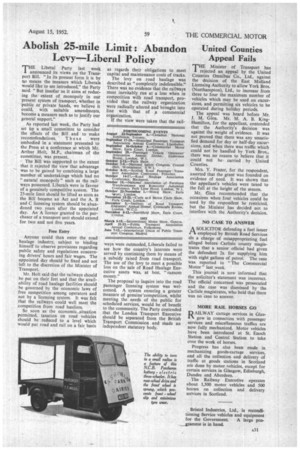United Counties Appeal Fails
Page 33

If you've noticed an error in this article please click here to report it so we can fix it.
THE Minister of Transport has rejected an appeal by the United Counties Omnibus Co., Ltd„ against the decision of the East Midland Licensing Authority to allow York Bros. (Northampton), Ltd., to increase from three to four the maximum number of vehicles which may be used on excursions, and permitting six vehicles to be operated during holiday periods.
The appeal was heard before Mr. J. M. Glen. Mr. M. A. B. KingHamilton, for the appellant, contended that the Authority's decision was against the weight of evidence. It was not proved that there was any unsatisfied demand for day or half-day excursions, and when there was traffic which could not be handled by York Bros., there was no reason to believe that it could not becarried by United Counties.
Mrs. Y. Frazer, for the respondent, asserted that the grant was founded on evidence of need. It was shown that the appellant's vehicles were taxed to the full at the height of the season.
Mr. Glen recommended that the occasions when four vehicles could be used by the respondent be restricted, but the Minister has decided not to interfere with the Authority's decision.
NO CASE TO ANSWER
ASOLICITOR defending a fuel issuer employed by British' Road Services tin a charge of misappropriating, fuel alleged before Carlisle county magistrates that a senior official had given the defendant 2s. for supplying him with eight gallons of petrol. The case was reported in "The Commercial Motor" last week.
This journal is now informed that the solicitor's statement was incorrect. The official concerned was prosecuted and the case was dismissed by the Carlisle magistrates, who held that there was no case to answer.
MORE RAIL HORSES GO
D AILWAY cartage services in Glas
gow in connection with passenger services and miscellaneous traffics are now fully mechanized. Motor vehicles have been introduced at St. Enoch Station and Central Station to take over the work of horses.
Progress has also been made in mechanizing goods-cartage services, and all the collection and delivery of traffic at goods stations in Scotland are done by motor ,vehicles, except for certain services in Glasgow, Edinburgh, Dundee and Aberdeen.
The Railway Executive operates about 1,300 motor vehicles and 500 horses on collection and delivery services in Scotland.




















































































